11 start with K start with K

Since many of Kafka's visits to the cinema occurred during bachelor trips with Max Brod, Zischler's research took him not only to Kafka's native Prague but to film archives in Munich, Milan, and Paris. Matching Kafka's cinematic references to reviews and stills from daily papers, Zischler hunted down rare films in collections all across Europe. A labor of love, then, by a true man of the cinema, Kafka Goes to the Movies brims with discoveries about the pioneering years of European film. With a wealth of illustrations, including reproductions of movie posters and other rare materials, Zischler opens a fascinating window onto movies that have been long forgotten or assumed lost.
But the real highlights of the book are those about Kafka himself. Long considered one of the most enigmatic figures in literature, the Kafka that emerges in this work is strikingly human. Kafka Goes to the Movies offers an absorbing look at a witty, passionate, and indulgently curious writer, one who discovered and used the cinema as a place of enjoyment and escape, as a medium for the ambivalent encounter with modern life, and as a filter for the changing world around him.

Born in 1963, Szilárd Borbély emerged as one of the most important poets of post-communist Europe, exploring the themes of grief, memory, and trauma in his critically acclaimed work. Following the murder of his mother during a burglary in 2000, and the subsequent breakdown and death of his father, Borbély suffered from post-traumatic depression and tragically ended his own life in 2014.
Among the manuscripts that Borbély left behind was Kafka’s Son, a fragmentary work, rendered still more fragmented through the author’s death. Through a series of haunting passages that explore early twentieth-century Prague, including the ruins of the ancient Jewish ghetto during the time of its demolition, Borbély inscribes the story of Franz Kafka and his father onto the city. We are used to hearing from Franz; here Hermann Kafka is also given a voice. “The son,” he tells us, “is the life of the father. The father is the death of the son.” By extension, then, this book is also an indirect telling of the story of Borbély and his father, and about sons and fathers in the Habsburg empire and the culture of brutality that defined Eastern Europe.
A posthumously published Hungarian masterpiece, Kafka’s Son now appears in English in award-winning translator Ottilie Mulzet’s sensitive translation, a fragmentary yet iridescent work inviting us to reflect on our fragmented lives.
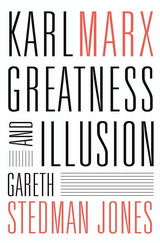
As much a portrait of his time as a biography of the man, Karl Marx: Greatness and Illusion returns the author of Das Kapital to his nineteenth-century world, before twentieth-century inventions transformed him into Communism’s patriarch and fierce lawgiver. Gareth Stedman Jones depicts an era dominated by extraordinary challenges and new notions about God, human capacities, empires, and political systems—and, above all, the shape of the future.
In the aftermath of the Battle of Waterloo, a Europe-wide argument began about the industrial transformation of England, the Revolution in France, and the hopes and fears generated by these occurrences. Would the coming age belong to those enthralled by the revolutionary events and ideas that had brought this world into being, or would its inheritors be those who feared and loathed it? Stedman Jones gives weight not only to Marx’s views but to the views of those with whom he contended. He shows that Marx was as buffeted as anyone else living through a period that both confirmed and confounded his interpretations—and that ultimately left him with terrible intimations of failure.
Karl Marx allows the reader to understand Marx’s milieu and development, and makes sense of the devastating impact of new ways of seeing the world conjured up by Kant, Hegel, Feuerbach, Ricardo, Saint-Simon, and others. We come to understand how Marx transformed and adapted their philosophies into ideas that would have—through twists and turns inconceivable to him—an overwhelming impact across the globe in the twentieth century.

Towards the end of the nineteenth century in East Prussia, a woman named Kazimira strolls the remote shores of the Baltic Sea, bringing home bits of amber that wash up on the beach. Her husband Antas is the region’s best carver, and he catches the attention of Moritz Hirschberg, owner of a nearby amber factory. Antas rises through the ranks, but Kazimira has the best ideas for processing and cutting the stones. Although establishing a new mine on such shifting terrain is hazardous, the venture finally pays off. It brings success, but envy and resentment swiftly follow, as antisemitism and nationalism sweep across the German Empire. Kazimira soon learns she must go her own way, as the Hirshbergs are expelled and World War I shatters her son. Three decades later, at the end of World War II, she becomes the last witness of German war crimes committed on West Beach, formerly a place of prosperity and progress.
At the dawn of the twenty-first century in Russia, a woman named Nadia operates an excavator in a massive open-pit amber mine until she is told to go sell trinkets alongside all the other shopgirls. In alternating passages weaving together vastly different eras across the span of a century and a half, Svenja Leiber’s Kazimira tells the story of the largest amber-mining operation in history, and its lasting effects expose pressing questions: Where do hatred and violence come from? What happens when life is declared worthless? Beginning with Kazimira and her bold struggle for self-determination, this saga follows five generations of women who envision an alternative world.
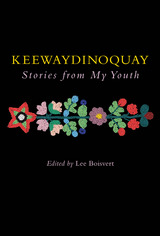
The stories span generations and cultures and shed a rare light on the living conditions of Native Americans in Michigan in the early 1900s. They recount Keewaydinoquay's education in the public schools, illuminate the role Christianity played in Native American culture, and reveal the importance of maintaining traditional customs.
Keewaydinoquay was one of the very few Native American women who was steeped both in the ancient folkways of her people as well as erudite in the American university system. Ultimately she wove her native tradition and university learning together into a unique perspective that helped people understand the importance of nature and the human spirit.
Keewaydinoquay Peschel was Lecturer of Ethnobotany and Philosophy of the Western Great Lakes Indians at the University of Wisconsin. She is the author of several books, including Blue Berry: First Fruit of the Anishinaabeg. She passed over in 1999. Lee Boisvert attended the University of Michigan as a member of the Residential College from 1967 to 1969, and was awarded a Bachelor in Science in Sociology with double minors in Native American Studies and Gerontology by Central Michigan University in 1993.
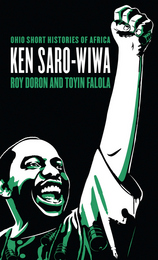
Hanged by the Nigerian government on November 10, 1995, Ken Saro-Wiwa became a martyr for the Ogoni people and human rights activists, and a symbol of modern Africans’ struggle against military dictatorship, corporate power, and environmental exploitation. Though he is rightly known for his human rights and environmental activism, he wore many hats: writer, television producer, businessman, and civil servant, among others. While the book sheds light on his many legacies, it is above all about Saro-Wiwa the man, not just Saro-Wiwa the symbol.
Roy Doron and Toyin Falola portray a man who not only was formed by the complex forces of ethnicity, race, class, and politics in Nigeria, but who drove change in those same processes. Like others in the Ohio Short Histories of Africa series, Ken Saro-Wiwa is written to be accessible to the casual reader and student, yet indispensable to scholars.

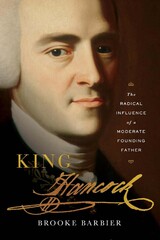
A rollicking portrait of the paradoxical patriot, whose measured pragmatism helped make American independence a reality.
Americans are surprisingly more familiar with his famous signature than with the man himself. In this spirited account of John Hancock’s life, Brooke Barbier depicts a patriot of fascinating contradictions—a child of enormous privilege who would nevertheless become a voice of the common folk; a pillar of society uncomfortable with radicalism who yet was crucial to independence. About two-fifths of the American population held neutral or ambivalent views about the Revolution, and Hancock spoke for them and to them, bringing them along.
Orphaned young, Hancock was raised by his merchant uncle, whose business and vast wealth he inherited—including household slaves, whom Hancock later freed. By his early thirties, he was one of New England’s most prominent politicians, earning a place on Britain’s most-wanted list and the derisive nickname King Hancock. While he eventually joined the revolution against England, his ever moderate—and moderating—disposition would prove an asset after 1776. Barbier shows Hancock appealing to southerners and northerners, Federalists and Anti-Federalists. He was a famously steadying force as president of the fractious Second Continental Congress. He parlayed with French military officials, strengthening a key alliance with his hospitable diplomacy. As governor of Massachusetts, Hancock convinced its delegates to vote for the federal Constitution and calmed the fallout from the shocking Shays’s Rebellion.
An insightful study of leadership in the revolutionary era, King Hancock traces a moment when passion was on the side of compromise and accommodation proved the basis of profound social and political change.
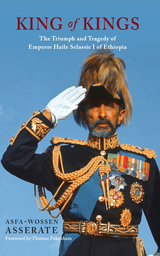
Written by Asfa-Wossen Asserate, Haile Selassie’s grandnephew, this is the first major biography of this final “king of kings.” Asserate, who spent his childhood and adolescence in Ethiopia before fleeing the revolution of 1974, knew Selassie personally and gained intimate insights into life at the imperial court. Introducing him as a reformer and an autocrat whose personal history—with all of its upheavals, promises, and horrors—reflects in many ways the history of the twentieth century itself, Asserate uses his own experiences and painstaking research in family and public archives to achieve a colorful and even-handed portrait of the emperor.

A celebrated writer returns to his hometown of Odessa, pondering a deal with the secret police, pining for a daughter living abroad, and hoping to pen one last homage to his own past. Isaac Babel, the world famous spinner of tales about Cossacks and gangsters, arrives in Odessa to be treated for asthma-and perhaps help a condemned prisoner to escape. Or is it Babel who intends to escape?
For six decades our only record of Babel's visit has been the contents of letters and postcards sent abroad to his mother and sister. In King of Odessa, Robert A. Rosenstone imagines a version of this visit and the novel Babel wrote during those weeks. Babel himself is concerned with more than literary plots as he considers an escape just as he starts an affair with an actress who may be a police spy. He also ruminates on his past-his childhood as a sickly Jewish boy, the horrifying 1905 pogrom, the famous rides with the Cossacks that inspired Red Calvary, and above all his complicated relationships with women. Throughout the novel Rosenstone captures Babel's lively wit, his exhaustion with fame and the Soviet system, and his infectious charm.
This would prove to be Babel's last visit to Odessa. Three years later, he was arrested as a spy and executed. Rosenstone, the acclaimed biographer of writer and activist John Reed, mixes historical facts and fiction with the talent of a gifted storyteller. The result is a captivating exploration of a great writer surrounded by history and on the brink of falling out of it forever.

READERS
Browse our collection.
PUBLISHERS
See BiblioVault's publisher services.
STUDENT SERVICES
Files for college accessibility offices.
UChicago Accessibility Resources
home | accessibility | search | about | contact us
BiblioVault ® 2001 - 2024
The University of Chicago Press









